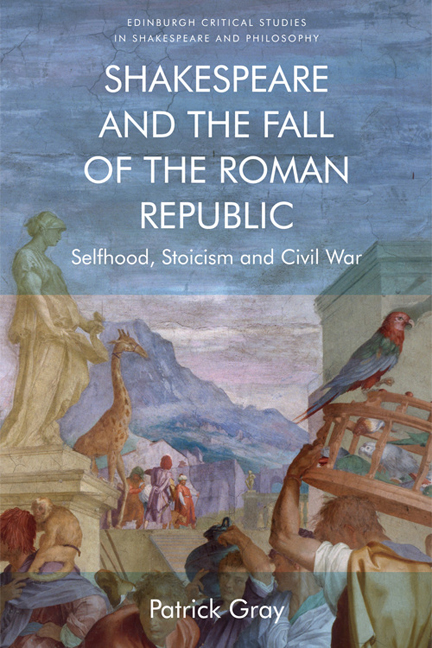3 - ‘The High Roman Fashion’: Suicide and Stoicism in Antony and Cleopatra
Summary
In Julius Caesar, Shakespeare focuses on the most obvious forms of human passibility: our mortality, our physical weakness, and our susceptibility to passions such as anger, grief and pity. In his later Roman play, Antony and Cleopatra, Shakespeare turns to a different and more subtle aspect of human vulnerability: our sensitivity to shame. In the general introduction, I suggested that, whereas Julius Caesar shows the end of the dying Republic, Antony and Cleopatra shows the beginning of the Roman Empire, and that this transition mirrors the contemporary English ‘crisis of the aristocracy’. In this later tragedy, Shakespeare considers the attractions of art itself as an escape, given the deep-set sense of humiliation that this kind of crisis can provoke. English aristocrats who once prided themselves on being warriors found to their chagrin that they were now obliged to become courtiers, instead: the yes-men they had once so heartily despised. Shakespeare mocks such spineless flatterers in the form of characters such as Osric in Hamlet and Oswald in King Lear. The English nobility did not blithely relinquish their traditional conception of themselves, but instead met the diminution of their power with anxiety, indignation and occasional outbreaks of reactionary violence. Essex's ill-considered rebellion is the most obvious example; others include duelling, privateering, foolhardiness on the battlefield, and an effort to revive medieval chivalric practices such as jousting.
As traditional martial autonomy became ever more circumscribed, the same class of noblemen who sought solace in the late Elizabethan chivalric revival also found consolation in the new philosophy of Neostoicism. As it once had in ancient Rome long before, the characteristic will to power St Augustine calls libido dominandi turned inwards towards conquering the self rather than the world at large. In Antony and Cleopatra, as in Julius Caesar, Shakespeare is keenly interested in the mutability and volatility of this kind of thwarted ambition. Uncertain how best to proceed, Roman protagonists such as Brutus and Antony move back and forth, vexed, between the objective pursuit of political independence and the subjective cultivation of emotional invulnerability. Brutus abandons his initial Stoicism to become a man of action, but too late. Even when he does try his hand at politics, he cannot shake off his tendency to approach oratory as if it were a game within his own mind, a logical puzzle to be solved by pure ‘reason’ (3.1.237).
- Type
- Chapter
- Information
- Shakespeare and the Fall of the Roman RepublicSelfhood, Stoicism and Civil War, pp. 177 - 219Publisher: Edinburgh University PressPrint publication year: 2018

